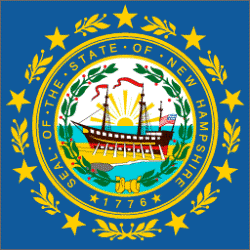New Hampshire Considers Expanding Gambling Industry

It is difficult to tell whether New Hampshire’s proposed online gambling bill will stand any chance of success, especially considering states like New York and Pennsylvania have been struggling for years to get similar legislation passed. This is because unlike the two states mentioned, The Granite State has shown little interest in online casinos or poker in the past, and furthermore, there is currently no legal gambling in New Hampshire to speak about, with the exception of the lottery, and some dog and horse racing. That said, it appears New Hampshire might finally be shifting its attitude, as there has been some movement lately on the issue of casino and online gambling.
Casino Legislation
The state senator from New Hampshire, Lou D’Allesandro, has been a gambling and casino proponent for almost two decades, and in the past has proposed several casino bills to try and push legalized gambling in the state. Nevertheless, all his efforts have been to no avail, with the most success he has enjoyed so far coming in 2014 when a bill of his garnered support from the Senate, and then the governor’s office, only for the House to ultimately vote against it.
The senator has kept trying, though, and this year he finally succeeded in having his Senate Bill 242 make it through the State Senate, before eventually stalling in the House, with the bill subsequently having been put on official hold since May 4th. In the meantime, there were a number of proposals that the bill left vague, including the locations for the two permitted casinos, as well as the possibility of allowing a single company to bid for both of the available licenses, therefore potentially creating a monopoly of the state’s casino industry.
In the bill’s favor, however, is the fact New Hampshire is in need of the potential $150 million in revenue that would come from a 35% gaming tax on casinos, in addition to the numerous construction and casino jobs that would be created by given the casino projects a green light.
East Coast a Proven Market
Also in the legislation’s favor is the fact New Hampshire is certainly part of a proven East Coast gambling market, as demonstrated by the overall success of New Jersey’s famous resort of Atlantic City, as well as the other gambling states situated on the eastern seaboard. After several years in the doldrums, and following increasing competition from its neighbors, Atlantic City has recently returned to growth, helped along by it being just one of three states in the US with a regulated online gambling market, the others being Delaware and Nevada.
Meanwhile, Pennsylvania’s casinos continue to generate impressive earnings each month, while Maryland has successfully been attracting new customers to its thriving resorts, including its latest addition the $1.4 billion MGM National Harbor. Even New York has has added a few more casinos to its gambling market over the past year, making it is possible that New Hampshire could also get in on some of the gambling action.
Current Gambling Available
There are already a few different legal, independent poker rooms that can be found throughout the state offering games such as blackjack and roulette, although the law states that these games must be for charity. Nevertheless, some cash and prizes are offered, while players are also able to place bets on dog and horse races from these venues. While these establishments may not run like an authentic poker room in a casino, they do still provide more hope for gambling advocates to see legalized gambling in the state one day.
Online Gambling Bill
As well as considering the legalization of casinos, another bill dealing with online gambling called H 562 has also been introduced to the legislature. Similar to S 242, this bill is a placeholder bill, with its text short and kept deliberately vague in order to allow for further discussion on important issues related to regulation and legislation. As the bill in its entirety reads:
“This bill exempts gambling done over the Internet from gambling offenses under RSA 647. The Department of Justice to date has neither investigated nor prosecuted online gaming offenses and therefore does not expect this bill to have any impact on expenditures. To the extent this bill legalizes a form of gambling, it may have an indeterminable impact on lottery and charitable gaming revenue. Lottery and charitable gaming revenue is credited to the lottery fund, with net revenues after Lottery Commission expenditures being credited to the state education trust fund.”







